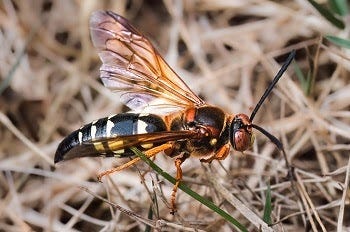
(WWJ) As cicadas emerge from the ground to broadcast their summer soundtrack from the trees in Michigan, out comes the cicada killer wasp.
And while these rather large insects may look a little scary, the Michigan Department of Natural Resources wants you to know that they're certainly dangerous to cicadas ... but not so much to humans.
Measuring over an intimidating inch in length, cicada killer wasps are built to capture and subdue large adult cicadas.
According to DNR biologists, while male wasps may be territorial or act aggressively, they lack a stinger and pose no danger to people.
And while female wasps do have stingers, they use them primarily to inject venom into their prey and carry it back to their burrow, and will only sting in self-defense.
Just like the cicadas, the DNR says cicada killer wasps don't stick around too long, and will die as summer wanes.
“You may see these wasps while you’re outside this year and immediately think of the stories of giant murder hornets invading North America,” said DNR game biologist Karen Cleveland. “Don’t worry. This secretive native insect has been here all along, and can be found silencing cicadas across the entire eastern U.S.”
Cleveland said that if you’re a good neighbor and respect the wasps’ space, they’ll be with us for a long time to come (which is supposed to be a good thing, we suppose?).
More good news about these creatures: You're not likely to encounter a swarm.
Cicada killer wasps are solitary, and female wasps are kept much too busy to spend too much time bothering you. The DNR says the female cicada killers use their short time as adults to dig burrows where they stash the cicadas they catch and lay their eggs.
Get more information about cicada killer wasps from Michigan State University Extension, at this link.


